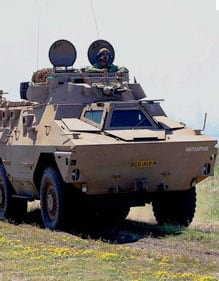|
Getting your Trinity Audio player ready...
|
 By Guy Martin
By Guy Martin
First published on DefenceWeb
Transparency International has hosted an anti-corruption workshop with civil society leaders in Johannesburg, after providing anti-corruption training and guidance to the South African military.
Leah Wawro, the project lead for civil society at Transparency International (TI) UK’s Defence and Security Programme, said that thanks to the arms deal, people are highly aware of defence corruption in South Africa. However, corruption takes many forms and defence procurement is not the worst affected area – TI has found that most corruption takes place in military operations.
For instance a recent draft UN report said that its peacekeepers commonly pay for sex with cash, dresses, jewellery, perfume, cell phones and other items, despite a ban on such relationships with people the world body is trying to help.
Amira El-Sayed at TI’s Defence and Security Programme said that the organisation regularly measures the perceived levels of defence corruption around the world; for instance the 2013 index covered 82 governments, 19 of which were in Africa. However, the 2015/16 survey will cover 120 countries, including the whole of Africa.
In 2013, South Africa ranked in TI’s D Plus band, which together with Kenya was among the top two countries for least perceived defence corruption. TI found that although regulations and processes were strong in theory, they were weak in reality and that there was no anti-corruption training before troop deployments; intelligence services were beyond oversight and whistle-blowers were not protected.
Corruption in the military a big problem
Corruption Watch, a chapter of Transparency International, also participated in the workshop held at Section 27 in Braamfontein, Johannesburg, last week. Ronald Lucky Menoe from the organisation said that it currently has 9 000 reports of corruption in South Africa on its system, with corruption evident in most government sectors, particularly home affairs and education. Corruption Watch has only started looking into defence corruption this year and is busy with preliminary investigations.
Pikkie Greef, national secretary of the South African National Defence Union (Sandu) outlined some instances of corruption within the South African military. For instance, a commander in Polokwane was moved from one post to another owing to procurement irregularities at the base involving items like rations. Instead of this person being prosecuted in a military court he was simply moved to another position because of political cover, Greeff said.
Greeff gave other examples, where a military official in Port Elizabeth was allegedly calling up reserve members for a fee; an officer commanding a base in the North West province was placed under suspension after allegations of fraud and tender rigging because he himself pointed out procurement regularities in the South African Army; the air force was leasing aircraft from a company that did not own any aircraft; and an air force general has been suspended with full pay for nine years because of sexual misconduct allegations after criticising the 1998 arms deal.
Greeff said that not all corruption was financial – a lot of it was political, with officials being protected thanks to their political connections, and appointments being made based on political grounds, not merit. Greeff said it was very demoralising for a soldier to serve in a defence force where these things are going on.
Dale McKinley of the Right2Know Campaign discussed defence corruption in the wider political and economic context, saying that corruption in the South African National Defence Force (SANDF) has become part of a systemic crisis of mismanagement, corruption and a lack of political will. He said there was a conscious programme to securitise the state, with most senior officials in the defence force being political appointments. McKinley emphasised that corruption is not just about money – it manifests in political corruption, deployments etc.
Erika Gibson from Netwerk24 discussed the role and responsibility of the media in defence corruption reporting, giving the examples of private contractors cosmetically repairing SANDF vehicles, which subsequently broke down; the fact that people responsible for failures in the Battle of Bangui in the Central African Republic were not held accountable for their actions; and a lack of military oversight in Parliament.
Gibson said she was worried because of incidents such as that which happened in May last year, when a general deployed infantry vehicles and busloads of armed soldiers to secure the release of soldiers arrested at a shebeen in Bongilethu, Oudtshoorn. She said it is a problem that there are very few military journalists in South Africa and that the problem is getting worse as news rooms are shrinking and resources decline.
She suggested that defence journalists pool their resources together in order to properly investigate stories, as there are many issues that investigative journalists need to probe.



